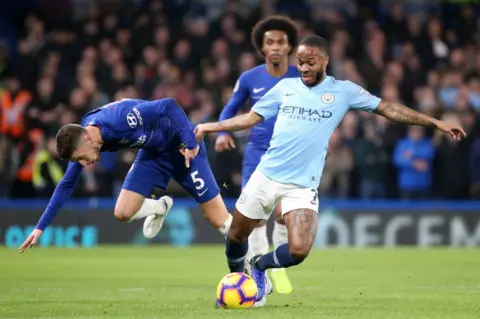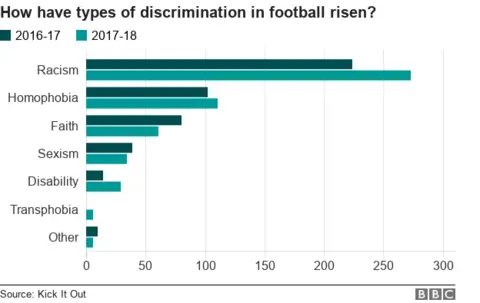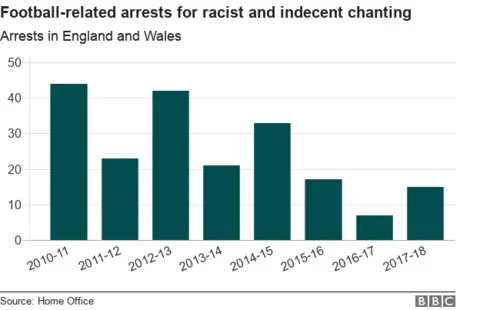Sterling: Is football racism rising?
 Getty Images
Getty ImagesEngland international and Manchester City forward Raheem Sterling said he suffered racial abuse from Chelsea fans during his side's 2-0 defeat on Saturday.
Police and Chelsea say they are investigating the alleged racist abuse and the club has suspended four fans. The Premier League says anyone found to have been racially abusive deserves to be punished.
But is the alleged abuse of Mr Sterling symptomatic of football-related racism getting worse?
Unfortunately, it's very difficult to measure the scale of the problem with statistics alone.
Kick It Out, a football equality charity, publishes annual statistics based on reports of discrimination it has received over the previous 12 months. Reports can come from all levels of the game, from the Premier League down to grassroots football.
Its latest report showed there were 520 incidents in the 2017-18 season, up from 469 in 2016-17.
Most of these reports (53%) were about racism.

The data is based on reports that both players and spectators submit to the Kick It Out website.
However, the problem with this method - which Kick It Out acknowledges - is that it's impossible to say whether there's been a genuine increase in racist abuse or people have just become more likely to report it.
So where else can we turn to for data?
The Home Office publishes statistics on football-related arrests in England and Wales. It shows that out of the 1,500 football-related arrests last season, 15 arrests were for racist and indecent chanting.
While that's more than double the arrests in 2016-17 season, it's significantly down from the peak of 44 arrests in 2010-11.
But these figures reveal only how many people were arrested and not the actual number of racist incidents.

A football banning order is available to the courts and local police forces to prevent individuals from attending matches. As of 1 August 2018, there were 1,822 such banning orders in force - a fall of 43% since 2011.
But the Home Office told BBC News it wasn't possible to say how many of the existing football banning orders related to racism.
Individual clubs may also take action against supporters that engage in racist behaviour. After four fans refused to allow a black man on to the Paris metro in 2015, Chelsea banned them from attending any of the club's matches for life.
BBC Reality Check asked the Premier League what requirements - if any - were placed on clubs to keep a record of racist incidents that occurred in or around stadiums and what action was taken.
It told us that whilst all clubs would almost certainly keep their own records on banning orders, or allegations made at their own ground, the data is not collected centrally.
'Half of fans' witnessing racism
While racism in football still persists, it has fallen a lot since the 1980s - according to Prof Ellis Cashmore, a sociologist and expert in football racism, at Aston University:
"Today's racism is nowhere near the level of the 1980s and it's extraordinary that it still clings to this sport given it is so diverse.
"But in football there seems to be a preservation of a racist tradition," he says.
Racist abuse, he says, started to become less common in the 1990s as more world-class players from abroad were recruited by English clubs - but the problem resurfaced in the early 2000s.
In 2011, Luis Suarez was banned for eight matches after being found guilty, by the FA, of racially abusing Patrice Evra (allegations which Suarez denied).
That incident, according to Prof Cashmore, was a turning point because more players felt empowered after that to speak out against racial discrimination.
But, he says, pockets of racism still exist.
In 2014, Prof Cashmore carried out a study involving 2,500 anonymous football fans to try to unearth attitudes towards racism.
It found that half of all fans witnessed or experienced some form of racism in British football.
One person who responded to the survey said that while racism may no longer be as vocal as it once had been "anyone who attends football on a regular basis will confirm racist undertones are still there and very much alive".



